Spoilers, obviously.
When I was a teenager, I was fascinated by V for Vendetta. I think I first saw that movie on a plane, more or less on a whim. And I was so incredibly and immediately enthralled that I watched it again as soon as it finished, and then proceeded over the following years to show it to all of my friends until they all got sick of it. I had never seen a movie like V before. Besides being a surprisingly intellectual film — yes, even in the midst of a masked Hugo Weaving beating people to a pulp — I was most taken aback by its relatively simple message. Authoritarian control depends on the masses to sit back and, either out of laziness or cowardice, do nothing. And even small acts of rebellion, like, say, a little girl spray painting an upside down anarchy symbol on a wall, can force real meaningful change.
I was thinking about V for Vendetta for the first time in years, as I sat in contemplative silence a few nights ago. The last episode of Andor had long since finished by that point, the end credits had streamed on by and Disney+ was trying to autoplay some other starwars media on the TV. I didn't really notice or care. I was still in that stunned silence that only ever occurs when a truly fantastic piece of media ends. And Andor really truly is a fantastic piece of media. If you have not seen it, I recommend you put this review down and watch it immediately.
First, let's get the obvious out of the way. Andor meets the table stakes that are required of any StarWars property worthy of the brand.1 The show is visually stunning. The musical score is beautiful and epic. It pushes the boundaries of sci-fi in the best possible way, because there is a deep care for making everything seem not just plausible but realistic. Of course there are entire worlds that are agricultural hubs to service other metropolitan planets. Of course there is an Imperial bureaucracy, and of course they have mindless meetings that they all hate. Of course there is space-France.
The best story-tellers are capable of making their worlds feel lived in through attention to detail and a wide tapestry of rich and believable characters. This was in many ways a large part of the appeal of the original Star Wars trilogy. Viewers were dropped into this galaxy from long ago and far away, introduced to these characters who not only had full personalities but also had these only-hinted-at backstories. How did Chewbacca end up with Han? There's a Senate? But wait, it's already been dissolved? Vader and Kenobi know each other??? Even the technology, with all its grime and dents and rust, has a clear history! It all serves a larger goal of pulling the viewer in, while also providing fertile ground for others to tell their own stories on the same surface. Suffice to say, Andor continues that tradition. The show is a masterclass in world building, and for that alone it should be praised as one of the better pieces of media of the last decade.
But what really elevates Andor — and the reason I am writing about it today — is what it has to say about the world. This is not a kids show. It is thoughtful, powerful, and today, deeply relevant.
I've written before about the banality of evil, about how some of the worst atrocities known to man are downstream of individuals behaving in totally normal, totally ordinary ways. The treatment of the subject was one of the things that drew me to The Zone of Interest.
At the time of Arendt’s writing the 'banality of evil’ concept was pretty revolutionary. Evil was thought to be a really active process, something that relied on the full throated participation of ‘evil people’. It’s a nice fiction, it allows us to separate the world into clean categories of ‘good’ and ‘bad’ and mete out condemnation and punishment accordingly. But the Holocaust, with its tens-of-thousands of willing passive participants, showed that in reality evil can come from totally common and non-unique sources of motivation. Something as simple as wanting to excel at a job, for e.g.
Star Wars as a franchise is emphatically not about the banality of evil. In most Star Wars media, the Empire is basically just Vader and Palpatine, and maybe for the true fans Tarkin as well. There is no real nuance in these people's motivations, especially in the original trilogy. They are, bluntly, supervillains. There is literally a supernatural evil called "The Dark Side", which is wielded by evil space wizards who are evil more or less for the sake of being evil. Sure, there are a large number of nameless mooks — most iconically Stormtroopers — but, well, they're nameless mooks. They exist mostly as cutouts to shoot or be shot. No one ever came out of A New Hope wondering whether Stormtrooper #187204 had a family. In the timeless words of Harrison Ford, "hey kid, it ain't that kind of movie."
But if you take the Star Wars universe seriously for even a moment, the logistics of the Empire demands the presence of normal, everyday people just doing their jobs. Even if the very top of the Imperial reporting chain is a demonic manifestation of the concept of evil, you still need, like, guys to drive the transport ships around, or to staff the mid-level bureaucracy, or to actually run operations.
Andor is "that kind of movie." Tony Gilroy is deeply interested in exactly the kind of guy who is, for all intents and purposes, a totally normal person — and yet, is a part of the Imperial war machine. What is that person's background that brought them to where they are? What are their motivations? And most importantly, what happens to them?
Like any good treatise on the banality of evil, it is critical to humanize those in the white armor. So we get characters that we can't help but like, or at least empathize with. Yes, Syril is a sniveling brat but, damn, his mother is so overbearing and terrible that you feel sorry for him. Dedra is put together, competent, a woman in a man's world — it's easy to want her to succeed because we love stories where competence and gumption win out over stifling bureaucracy and misogyny. In any other story, she'd be the protagonist, saving the world from the terrorists against the impediments of the very organization she's trying to protect.
And Partagaz!
As in The Zone of Interest, the key tool in the writer's room is whiplash. It is critical that we see the ISB through the eyes of the people who work there because it makes it familiar to us. And then we inevitably get to the brutal reality of what the ISB actually does, and it all comes crashing down. We the audience are supposed to feel uncomfortable for identifying with Syril, Dedra, Partagaz, Heert, Mosk, Blevin, and more. The banality of evil necessarily reminds us that we too have it within us. There, but for the grace of god, go I.
Because Andor is a TV show instead of a movie, it is able to really dwell on what happens to these people. The answer isn't pretty. Both Syril and Dedra, two extremely loyal and extremely competent individuals, are essentially ground into dust by the uncaring fascist regime. The former is shot in the head as his entire life and sense of self collapses around him. The latter is sent to the same prison where our protagonist rotted for over a month.
Much can be written about these two characters as characters, but I want to focus here on the politics. Gilroy does a fantastic job capturing the nature of authoritarian governments. The bureaucracy of an authoritarian regime necessarily cannot care for individual flourishing or the value of a human life. As a result, the ISB is a nest of backstabbing corruption. Anyone who is legitimately interested in truth seeking, anyone who is an intellectual, anyone who tries to collaborate — they are all doomed to fail, because they are out-competed by self-serving traitorous ladder climbers.
The true tragedy of the more competent ISB members is that despite their competence they don't even realize they are being used until it is too late. We see it happen twice, on two different levels of management. First, through Syril, who is so excited for the cause that he does not even realize that he has not been told the actual horrific purpose of his role; and then again through Dedra, who does not realize that she will be hung out to dry even though she just did the same thing to Syril. Both Syril and Dedra at various points provide intellectual cover for the Empire, leveraging "order" and "safety" as weapons on the battlefield of ideas. Then they end up being destroyed not by rebels, but by their own colleagues.
There is a certain inherent incompetence that is a necessary trait to authoritarian governments. The Empire cannot actually create an environment where failure and truth-seeking can both be tolerated, so people who learn from failure or attempt to seek the truth are silenced. The irony of the ISB is that their entire reason for existence is to identify and react to what is happening on the ground; and yet, no authoritarian government can actually see clearly by their very nature. The ISB has to blind itself, and in so doing ends up being unable to fulfill its purpose. This is explicitly manifested in "Project Stardust" — the ISB is supposed to make sure that this top secret project stays top secret, even though most of the ISB doesn't even know what, exactly, they are protecting.
I think about the first episode of the last act. Dedra finally has Axis, just barely alive in the hospital. The long sought-after location of the rebel base and all of their contacts are nearly in hand. And then Dedra is arrested by Heert for coloring too far out of the lines, giving Kleya just enough of an opening to kill Luthen and escape. "Tyranny requires constant effort. It breaks, it leaks. Authority is brittle." It is the Empire's need for control that results in them tripping, over and over. Gilroy's Empire is one that is doomed to fail — not just because acts of oppression spiral into even further acts of rebellion, but because the authoritarian machine must necessarily eat its own most competent people.
It’s fair to wonder why anyone would willingly sign up for a government that inevitably turns on its own. I think, if you are a certain kind of optimist, you could construct a story about how Syril and Dedra and Mosk and so many more were being lied to, about how they signed up unwittingly. After all, we know the Empire has a massive propaganda arm. We know that the Empire is portrayed as a defender of order and justice. Maybe they were indoctrinated, maybe they were led astray, maybe it wasn’t their fault. If they were just shown the error of the ways, and had to face the full truth of the Empire’s authoritarianism, they could be redeemed.
Gilroy has no patience for this position.
The show is peppered with characters who, in any lesser piece of media, would have a full redemption arc — people who would defect from the Empire and join the Rebellion. The show revels in long camera shots of low-level Imperial grunts who are seemingly reconsidering their actions, all set to swelling hopeful orchestral music. It primes the audience to start thinking, "wait a second, this guy may turn into a good guy!" And then that person dies a horrible death.
Nurchi, the Ferrix dealer who rats out Cassian. Kloris, Mothma's driver and ISB plant. And, of course, Syril himself, Cassian's foil, the deuteragonist of the show. All dead. Whiplash.
The reality is that every one of these people knew exactly what the Empire was about. They just made a deal with the devil. They wanted short term power immediately. They wanted ability to feel important. They wanted to exert their will on the weak and less capable. And so, in exchange for a uniform and a gun, they traded their ability to escape later on when the Empire deemed them unnecessary and disposable.
The authoritarian impulse is inherently contradictory. There is no principle behind the Imperial regime beyond the concentration of power for those at the top and chaos and submission for everyone else. Since the release of A New Hope, fans have laughed at the inherent absurdity of the Death Star. “Why put all of your resources into a single weapon?” The answer is straightforward: such a super-weapon would effectively consolidate force into the hands of approximately three people. Anyone who fully understands this truth is given only two options: cynically try to climb the ladder so you can stay above the water line; or rebel in a desperate attempt to overthrow the system entirely.
About those rebels.
Andor is as much a show about the banality of evil, as it is about the “mundanity of heroism” (stealing this turn of phrase from this fantastic reddit post). Over the course of the show, we repeatedly discover that the Rebellion is propelled, sustained, and even saved by the heroic acts of its side characters, many of whom aren't even named. The Imperial admin who looks the other way as Cassian steals the experimental Tie Fighter. The mechanics who drag their feet opening the door to Mothma's chamber during her final Senate speech. The hotel clerk who simply does not log Andor's name into their system.
The beating heart of the show is Nemik, a kid, a total unknown, who is with us for only three episodes and dies an entirely unceremonious death five full years before the Battle of Yavin and the collapse of the Death Star. It is his words that ring out through the galaxy. Not Mothma's. Not Luthen's. Definitely not Cassian's. It is hard to imagine that someone so small could stand up to the Empire, with all its might and power. But Nemik understands that it is precisely the small who chip away at oppression and control, bit by bit. This is why Nemik beseeches us, over and over: "Try."
Rebellion does not have to look like Cassian Andor, swooping in to shoot some guys and save the day. It can be as simple — and as critical — as purposely misplacing some paperwork. And then these small acts of rebellion, each a drop of water, grows into a trickle, then a stream, then a river, then a pounding roar. Gilroy presents a "quietly radical" message: unremarkable, decent, determined people can make real change in the world.
Critically, the Empire does not seem capable of understanding why anyone would rebel at all. As part of their institutional inability to learn, there is simply no one within the government ranks who can get into the right mindset. To do so would be tantamount to criticizing the empire, which of course is a big no-no. This is why, in her last scene with Luthen, Dedra completely misunderstands why the Rebellion even exists.
Dedra: And here you were. All that time. Hiding in the shelter of imperial peace and quiet.
Luthen: And I've known you all along. Hardly seems fair.
Dedra: You disgust me.... Everything you stand for.
Luthen: Freedom scares you.
Dedra: Freedom. You don't want freedom. You want chaos. Chaos for everyone but you. Ruin the galaxy and run back to your ridiculous wig and little workshop.
Even when told otherwise directly to her face, Dedra assumes Luthen is motivated by selfishness. And why wouldn't she? That is exactly how she and everyone around her behaves! Dedra has no theory of mind here, she just assumes she's right. This is why she waits so long to actually stun Luthen — Dedra cannot imagine that Luthen would actually try to kill himself. After all, she would never!
Meanwhile, Luthen speaks for all of the rebels when he says "I've known you all along". An underappreciated aspect of oppression is the level to which people will modify their lives to avoid pain. Every single person who suffered at the hands of a Stormtrooper knows the Empire intimately — where to go to avoid scrutiny, what to do to minimize blowback, how to be and move about the world. The victims of the Imperial regime have to shoulder this additional burden just to make space for the demands of the Empire. But that burden gives them awareness. This is why Cassian is able to just 'walk right in' when he steals the StarPath unit that kicks off the show — he simply understands the regime better than the regime understands him.
The result is 'battalions' of people who know in their bones how to maneuver around the Empire's every action, going up against a bureaucracy that doesn't understand anything happening on the ground at all. It is that very same deep understanding that lets Luthen bait the Empire over and over. He knows that the Empire cannot help but overplay its hand. He knows that they have to double down every time, because to admit fault is to have the whole facade crumble. And he knows that in order to power the rebellion, all he needs to do is get people to understand the cruelty of the Empire the way he does.
With every provocation, he gets the Empire to plant the seeds of rebellion everywhere. Every time a character finally understands what the Empire is — whether it is Cassian on Narkina 5, or Wil after the murder of his father, or the countless senators after the Ghorman massacre — they line up to fight back. Yes, it's true that the Empire can project massive amounts of physical force. But Andor is a show that revels in spycraft, in the importance of knowledge and information and secrecy. And on that count, the Rebellion has the Empire fundamentally beat.
Partagaz, in his last scene, seems to finally realize how out of his depth he is, how impossible his job was. As the ISB comes crashing down around him we see him listening wistfully, mournfully, to Nemik's manifesto. Five years after Nemik's death on Aldhani, this document has made its way to the highest echelons of the Empire. "Who do you think it is?" he asks Lagret. It's an innocent question, but it betrays that even at the very end the Imperials are incapable of figuring out what is right under their noses. Partagaz seems to assume the author of the manifesto is some swashbuckling leader, a bold figurehead for a new government, someone of import, someone worth knowing. It's a profoundly Imperial, profoundly incorrect way of seeing the world. He takes that to his grave.
The true irony of both Dedra and Partagaz is that they have both embodied Rebellion's core principles even while serving the Empire. From Nemik, again: "Freedom is a pure idea. It occurs spontaneously and without instruction...Remember that the frontier of the Rebellion is everywhere. And even the smallest act of insurrection pushes our lines forward." Dedra's 'scavenging' for information directly violates Imperial procedure; and Partagaz more or less allows this to happen, even though Dedra is told off by her peers on multiple occasions.
Every time Dedra decides to snoop, or read a document she shouldn't access, or silently hoard data that she shouldn't have been sent, she too spontaneously commits a small act of insurrection. And her desire for freedom — freedom from the bureaucracy, freedom from her peers, freedom from the Imperial system — ends up massively helping the rebellion, so much so that Krennic accuses her outright of being a spy. One wonders if, during her time at Narkina, the cognitive dissonance will finally break. Partagaz of course will never have that chance.
The beauty of Andor as a piece of Star Wars media is that it recontextualizes so much of the rest of the franchise. Luke Skywalker is a hero, in the Marvel superhero sense of the word. But he is given the title by birthright. He is space royalty, he has wizard powers, he is destined to win. In that sense, who is really the greater hero: Skywalker, who has nothing to lose, everything to gain, magic and fate at his side? Or the quiet, unassuming members of the rebellion who don't even know if they are going to live to see another day?
The latter group has real stakes. They don't get "happily-ever-after." Their deaths are often brutal and stupid. Cinta, killed by her own teammates in a freak accident. Kino staring mournfully and joyfully out over the water, trapped in the prison he helped free. Lonni, the one person who deserved rest after so many years of service, found dead on a park bench by a dog.
In the larger context, Luke receiving a medal at the end of A New Hope feels like a slap in the face to the people who got their hands dirty in ways that actually mattered. To hell with anyone who says that you have to be 'someone important' to make change. Heroism is mundane. It is accessible. Anyone can make a difference in the world. "Try."
I'm sure some people will criticize me for bringing real world politics into a review about Star Wars. Those people have zero media literacy and are unlikely to have gotten this far in the review in the first place.
It is obvious that Gilroy is extremely well read on the subject of revolution, because real world parallels exist all over the show. Most relevant for me, now, is the tattered state of the US Government.
This is not the first time the Empire has been a stand in for the United States. George Lucas is on record stating that the inspiration for A New Hope came in part from the Viet Cong fighting against the US in Vietnam. History repeats itself; once more, the US plays the part of the Empire.
The Trump administration is shockingly akin to the Imperial Regime, complete with the totalitarian goal of complete consolidation of power2 — it is just much, much more stupid. Everyone in Trump's orbit is back-stabbing sycophant, willing to throw peers under the bus if it means an opportunity to get closer to the man in power. The administration is actively toxic to any kind of intellectualism. Trump 1 saw a rotating cast of actually-competent people who came in, realized what was happening, and left at first opportunity; Trump 2 has done away with any pretense of competence, and now the guy who wrote the MAGA children's book runs the FBI while the drunk with a texting problem heads up DoD. Even the supposed 'genius bar' that is DOGE ended up being staffed by true believers with names like 'Big Balls', while anyone with clear eyes realizes it's all bullshit.
The inevitable result of any administration that only rewards loyalty is system where power is inversely correlated with intelligence. Expertise requires disagreement; since there can be no disagreement, there are no experts. Instead, the dumbest people rise the fastest, because it turns out that it is easier to be a 'toady' if you have no prior information in your head to begin with. Unfortunately, obsequiousness begets institutional blindness. Trump’s administration is completely divorced from reality; every other week, there is some headline that shows that the president is not even being told what is happening in the world from his own lackeys.
Perhaps the only personal character trait more selected for than loyalty to Trump himself is self-aggrandizement. Noem, Rubio, Bondi, Musk, Leavitt. There is never a hint of regret, a hint of sadness, anything that would indicate that they have thought deeply about what they are doing. It would be one thing if they came out with real remorse and said, "look, it really sucks, but we have to do what we are doing for good policy reasons." But there is not even a fig-leaf. These people revel in talking about the lives they have destroyed. They openly brag about the laws they have broken and the crimes they have committed. The hubris and ego drips off their every word.
To quote Luthen: "The arrogance is remarkable isn't it? They don't even think about us. The way they laugh. The way they push through a crowd. The sound of that voice telling you to stop, to go, to move. Telling you to die. Rings in the ear doesn't it?" The Trump regime obviously does not cherish humanity. Everyone is either a pawn to be used and burned, or an obstruction to be dealt with. All that's missing now is the red light-sabers.
The GOP has purged all of the Cassians and Mothmas and Luthens from its ranks — those people have all more or less been forced to move to the left, because that is the only place where you can have any actual discussion of ideas. Given all that, who is actually left among the Trump's administration's supporters?
The first group are the Syrils — a collection of sad, pathetic, lost little people who are clinging to the first power structure that ever gave them any sense of validation. The simple reality is the countless useful idiots who spring to the defense of the Trump administration whenever called are often the same people who are going to be destroyed by Trump's policies. There is a reason why there has been such a proliferation of stories like these:
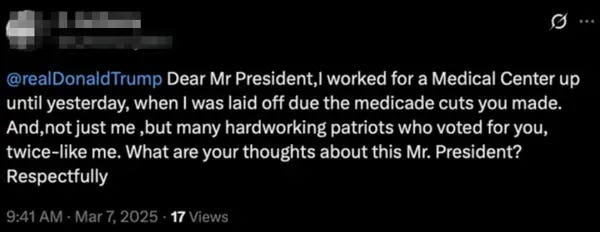
And the second group is the Dedras — a set of monstrous sociopaths, people who see the administration as an outlet for their worst tendencies, the Stephen Millers of the world, the people who would gladly orchestrate a massacre if it meant a promotion. It is chilling how quickly the term 'criminal' has come to mean 'person writing an op-ed' or 'Democratic House Rep' in the eyes of this government. And it is frankly damning that they somehow invented Narkina-5-style prisons through CECOT.
The incompetence, the arrogance, the sociopathy — it all leads the Trump regime to overplay its hand, just like the Empire. Every day Trump helps the populace understand exactly who he is. And that understanding ends up radicalizing the very populace he wants to subdue. The administration is following Luthen's playbook entirely by accident. It should not be lost on anyone that Trump’s approval rating is the lowest approval rating for any president at this point in term, ever.
As a result, mundane, heroic acts are starting to appear everywhere. It's small things. Consumers boycotting Tesla, law students refusing to work with any agency that has caved to the admin, neighbors organizing watch groups to track ICE vans. And those small things have provided cover for the big things. Judicial pushback. International shifts in supply chains. Protests by active members of congress.
Yes, much like the Yavin rebels, there is still a lot of infighting among those with disdain for Trump. The old-school anti-Trump GOP have yet to make peace with the far-left progressives, and as yet there is no Mothma who can come and unite the various strands around a single vision. But only a few weeks ago, a small sleepy neighborhood in Worcester, Massachusetts spontaneously came out in defense of their neighbors.
It’s hard to see the end of the tunnel when the protagonists haven’t yet materialized. But Andor tells us that heroes matter significantly less than the great mass of decent people that show up every day in whatever way they can. Small, decentralized, random acts of insurrection, like in Worcester, multiplied in the thousands across the country. That's all it takes.
There will be times when the struggle seems impossible. I know this already. Alone, unsure, dwarfed by the scale of the enemy. Remember this. Freedom is a pure idea. It occurs spontaneously and without instruction. Random acts of insurrection are occurring constantly throughout the galaxy. There are whole armies, battalions that have no idea that they've already enlisted in the cause. Remember that the frontier of the Rebellion is everywhere. And even the smallest act of insurrection pushes our lines forward. And then remember this. The Imperial need for control is so desperate because it is so unnatural. Tyranny requires constant effort. It breaks, it leaks. Authority is brittle. Oppression is the mask of fear. Remember that. And know this, the day will come when all these skirmishes and battles, these moments of defiance will have flooded the banks of the Empire's authority and then there will be one too many. One single thing will break the siege. Remember this. Try.
I say required table-stakes, but of course a great many StarWars properties don't even meet this necessary minimum. Looking at you, sequel trilogy.
They call it “unitary executive theory.”




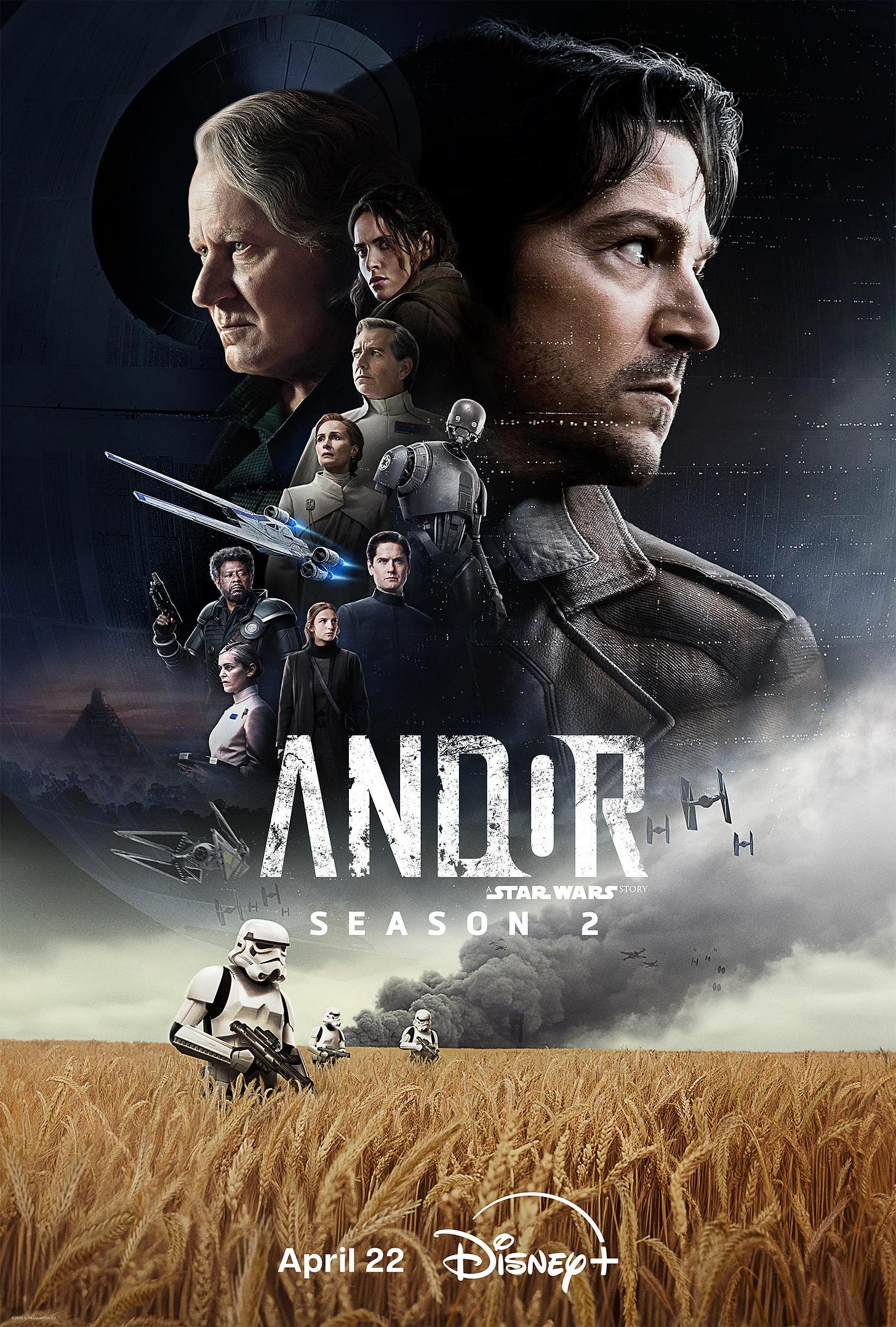

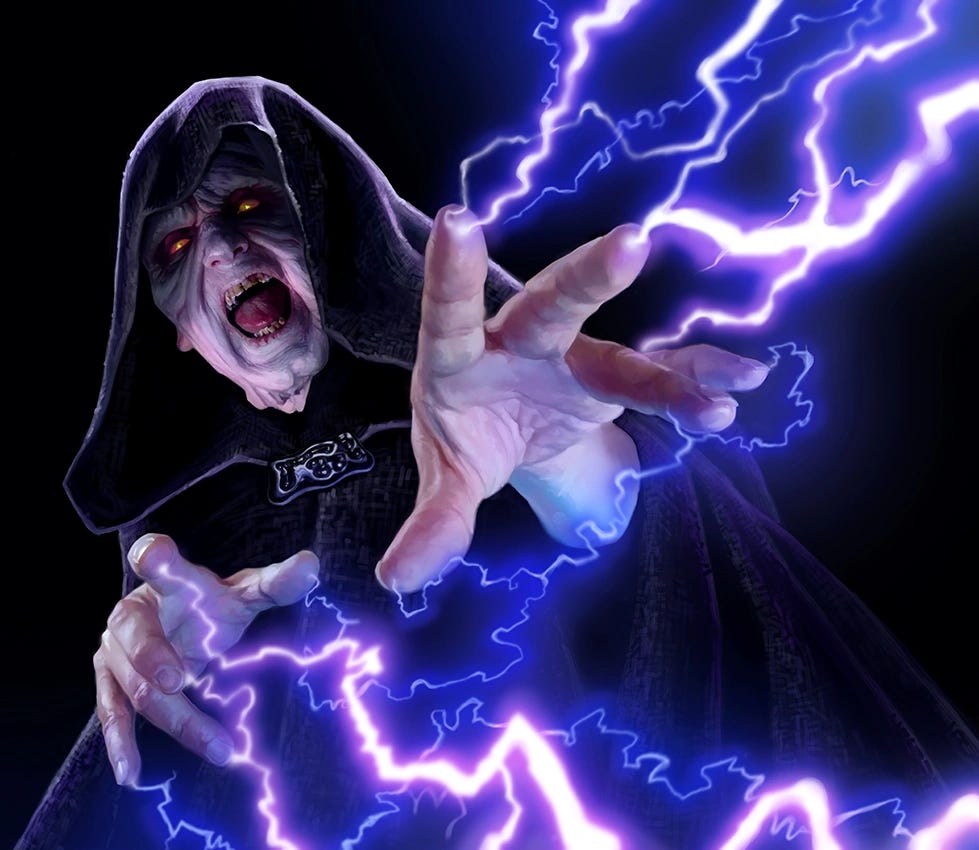
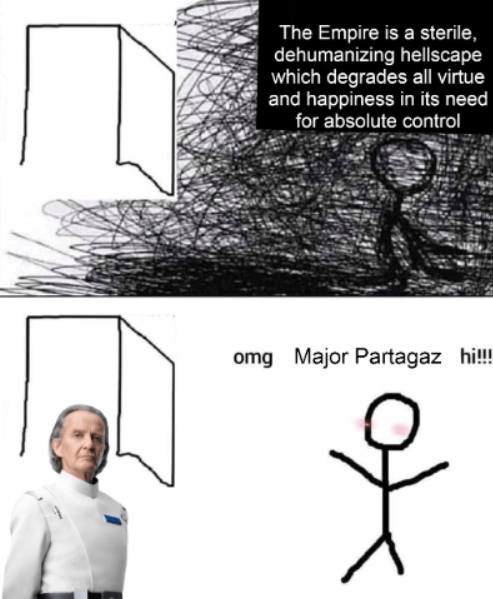
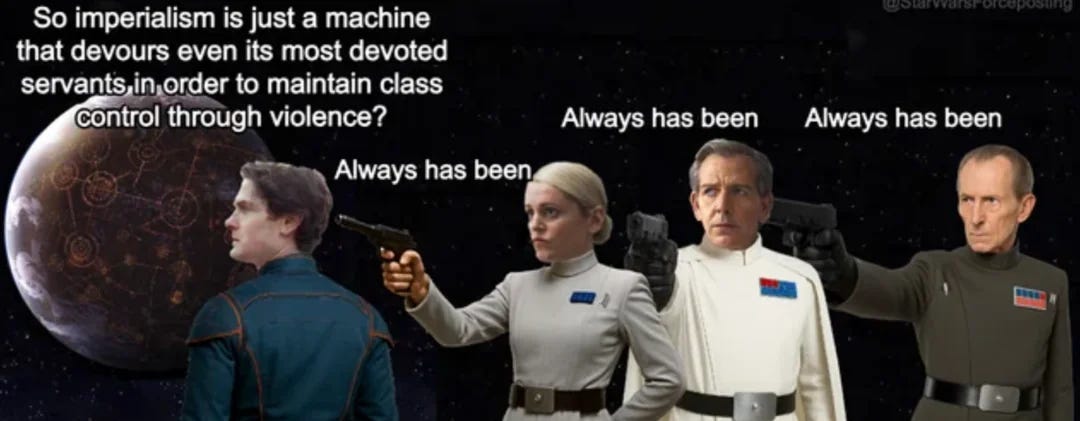
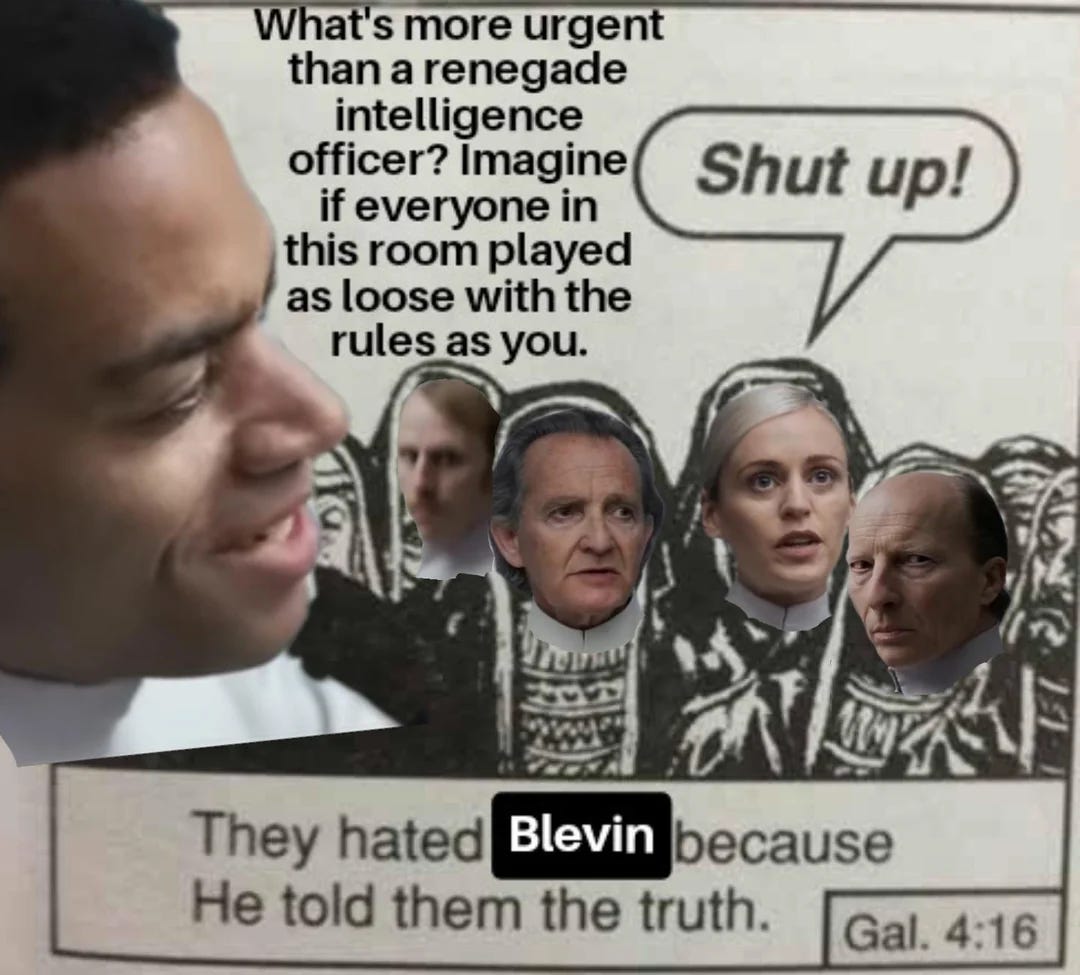
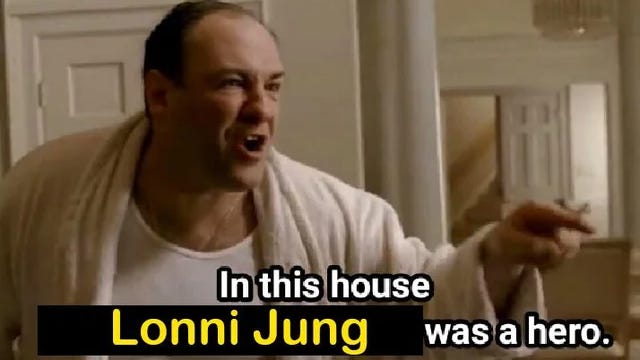
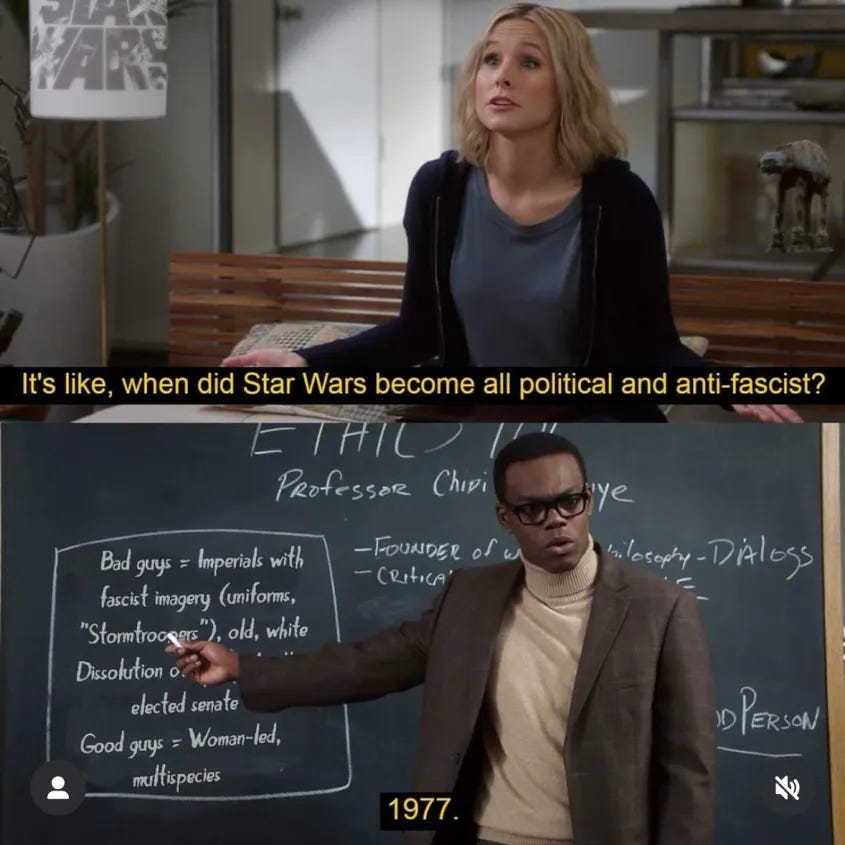
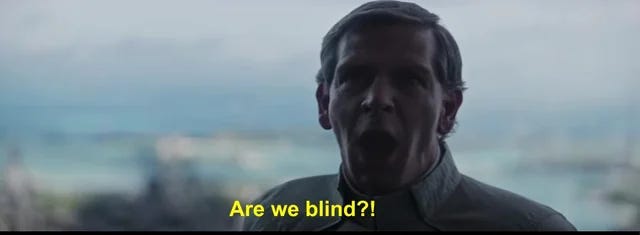
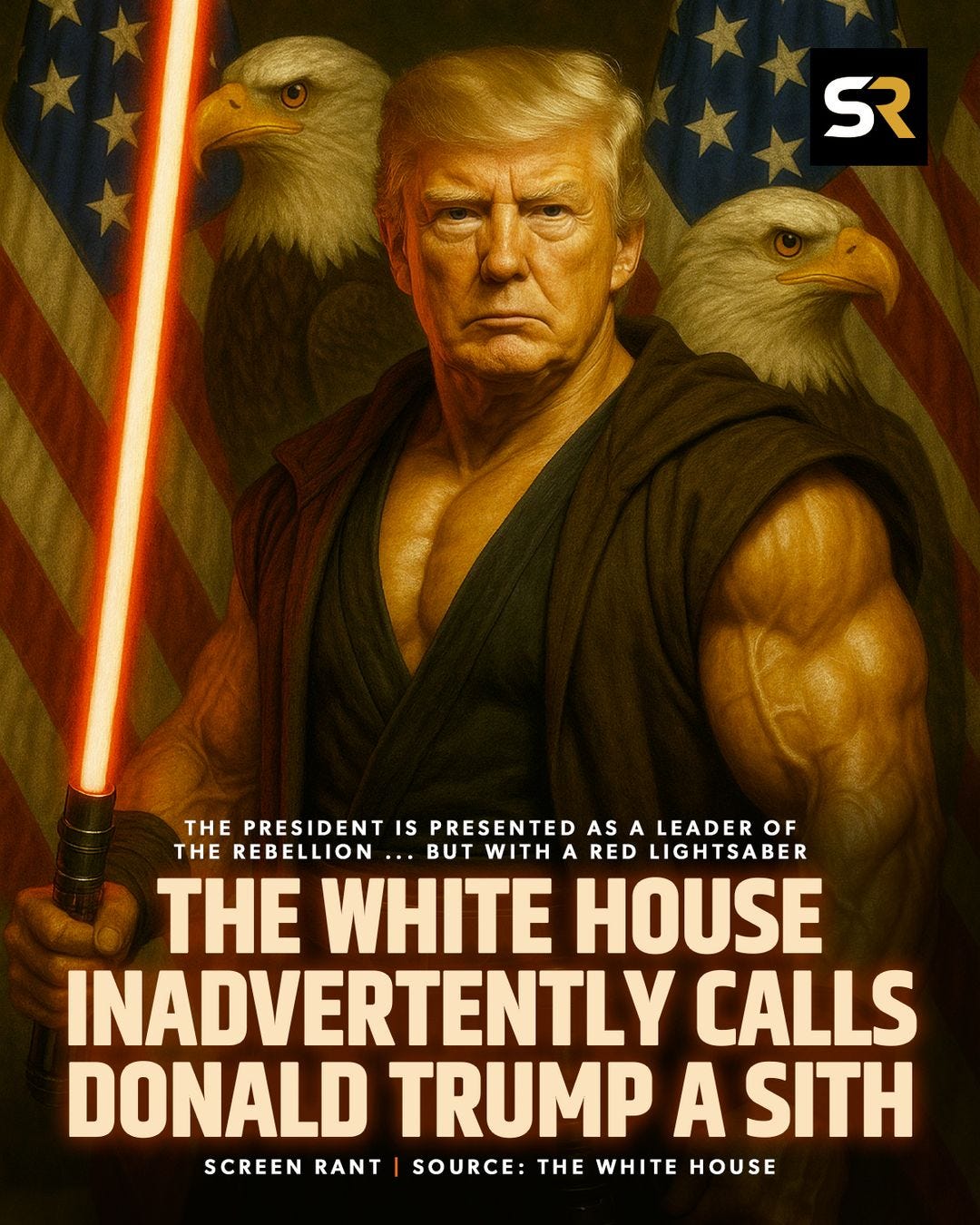

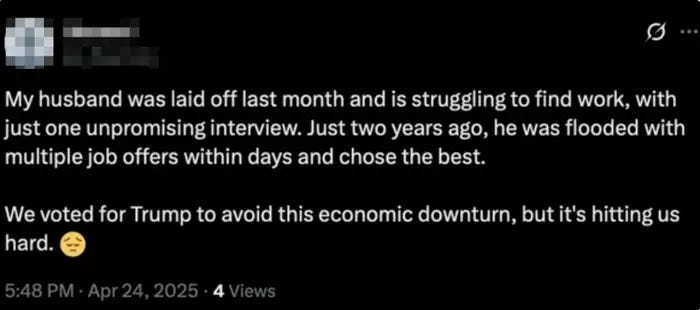

Fantastic. I just finished Andor and loved it so much. Your review is so well written and thoughtful. Thank you.
What a great essay. Wow.